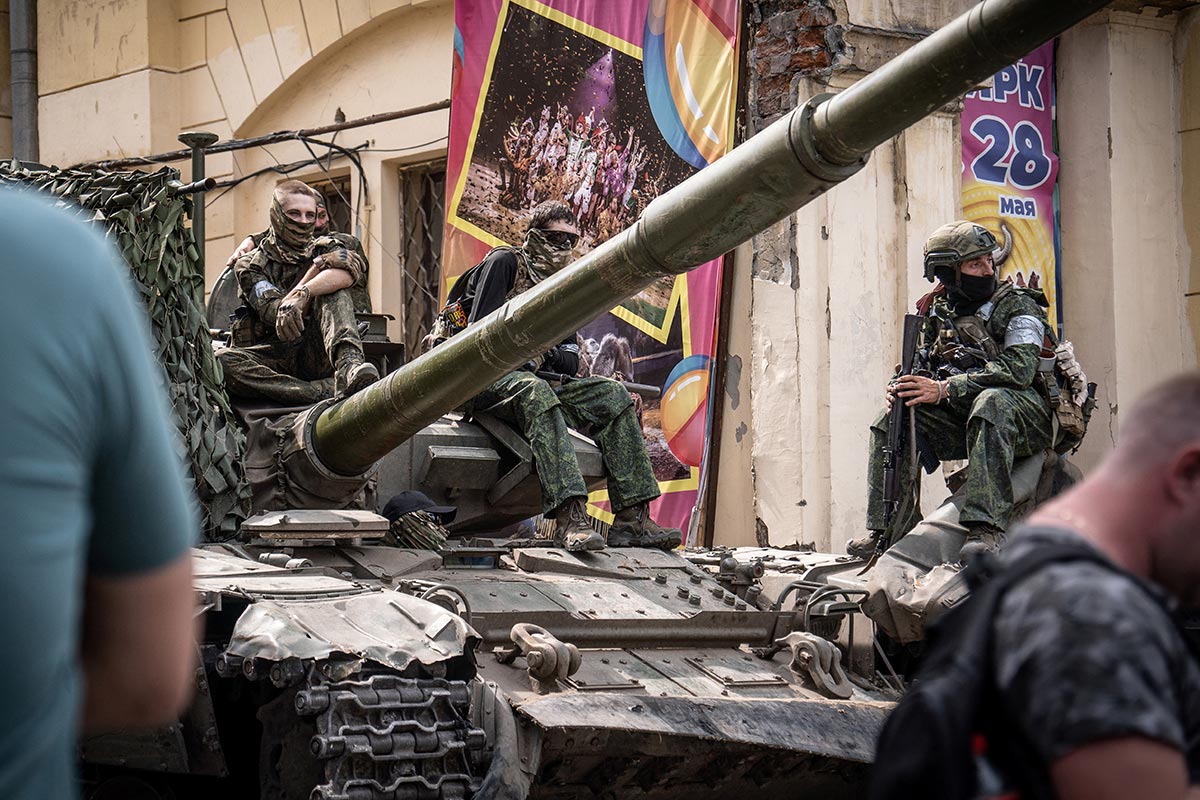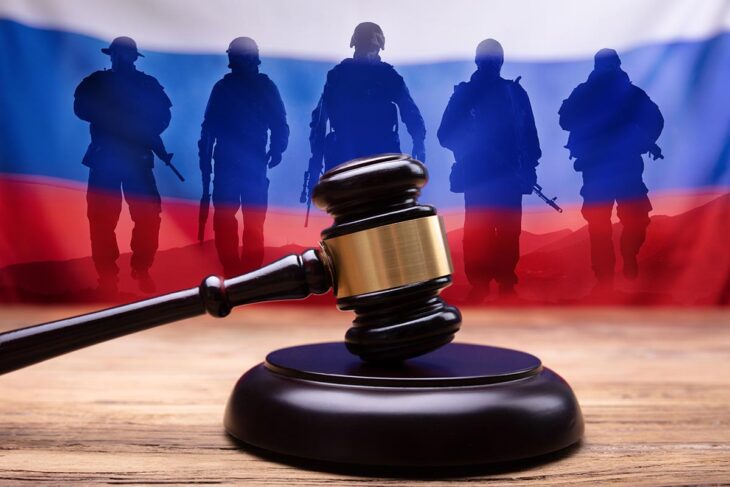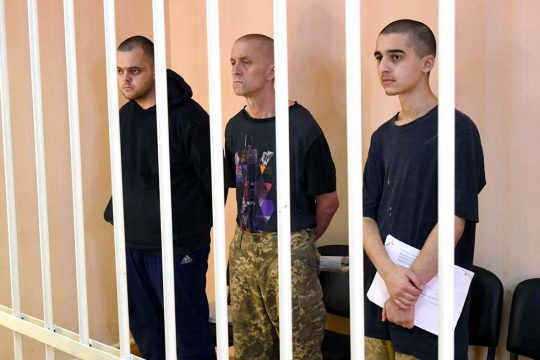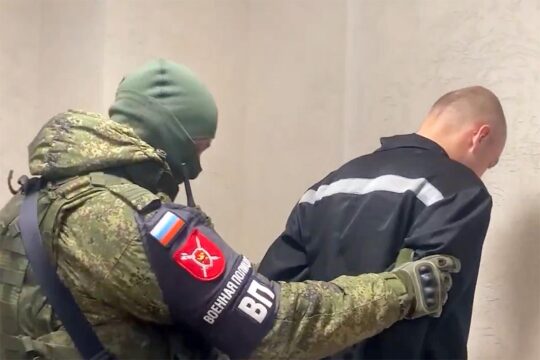Five citizens of the European Union are being tried in Russia as “mercenaries” in the war with Ukraine. Three Britons, a Croat and a Swede were captured and detained in the spring of 2022 in the Zaporozhye and Donetsk regions, occupied by Russian troops. At first, they were on trial in the so-called Donetsk Republic where they faced a possible death penalty. Then in September the accused were swapped along with other Ukrainian prisoners. But this spring the trial was transferred to a Russian military court. And now the hearings are being held in absentia.
The military court in Rostov-on-Don, in south-western Russia, held two hearings in the case of the five Europeans, the Croatian Vjekoslav Prebeg, the Swede Matias Gustafsson and UK citizens John Harding, Andrew Hill and Dylan Healy.
When the pro-Russian military captured them in 2022, the authorities of the unrecognised Donetsk People’s Republic accused them of undergoing training to seize power, forcibly seizing power, and participating as mercenaries in an armed conflict. Such charges made it possible to sentence them to death.
“The articles under which they are accused are quite serious. Here I would not rule out capital punishment,” Denis Pushilin, head of the self-proclaimed republic, said on a Russian federal channel last summer.
Imposing the death penalty would not be a new practice for the Supreme Court in Donetsk. In June last year, the court issued its first sentence against foreigners who fought in the Donbass on the side of Ukraine. Britons Aiden Aslin and Shaun Pinner, as well as Moroccan Brahim Saadoun, were sentenced to death. They were found guilty of mercenarism, attempted violent seizure of power and training in order to carry out terrorist activities. Pinner and Aslin surrendered in Mariupol, Saadun in Volnovakha.
The trial of the three defendants was held behind closed doors. Aslin, Pinner and Saadoun were members of the Ukrainian Armed Forces and had signed their contracts before Russia’s full invasion began. They lived in Ukraine for several years. Still, their actions were qualified as mercenarism.
Details from the Donetsk court
The case against the other five citizens of the European Union was first heard publicly on August 15, in a hearing held before the Appellate Chamber of the Supreme Court in Donetsk, where the first details about the identity of the accused prisoners became known.
Gustafsson served under contract in Mariupol in the 36th separate brigade of the Marine Corps as a steering minder of an infantry fighting vehicle.
Prebeg began his service in the Ukrainian army a few years ago. In an interview he gave after the swap he said that he went to Kyiv in December 2019 because he wanted to help Ukraine in its eastern war against pro-Russian separatists, and later signed up to join the Ukrainian army in May 2020. From that moment on, he served as a senior rifleman in the 36th brigade in Pavlopil.
Harding has previously participated in other military conflicts, including Syria. He signed a contract with the armed forces of Ukraine in the spring of 2018 and served as an instructor. In interviews that Harding gave later, he stated that he served in the role of a military medic. Healy arrived in Ukraine in March 2022, after Russia’s invasion began. Donetsk investigators claimed that he had come from Poland under the guise of a Red Cross volunteer. The media noted that Healy was engaged in humanitarian aid and helped local residents on behalf of the non-profit organization Presidium Network.
The third Briton Andrew Hill ended up in Ukraine at the same time as Healy. He was taking training courses for foreigners in Kyiv, the investigator said in the court in Donetsk.
Thus, at least three of the servicemen officially served in the Armed Forces of Ukraine, and at least two of the five defendants were taken prisoner at “Azovstal”, in Mariupol, by Russian troops.
“My nose was broken and brutal questioning began”
None of the foreigners admitted their guilt. Hearings were postponed until October but no new court sessions took place in the self-proclaimed republic: on September 21, Russia and Ukraine, through the mediation of Saudi Arabia, held a large-scale exchange of prisoners. 200 Ukrainians and ten foreigners, including the five accused and the three already convicted, returned home. Russia received 55 prisoners of war, as well as businessman and pro-Russian politician Viktor Medvedchuk. In the media, he is called the godfather of Russian President Vladimir Putin.
After returning home, three of the accused foreigners gave media interviews about the conditions of detention in the self-proclaimed republic.
“When I arrived there they took me out of the car; my head was covered with some kind of bag. I was immediately hit in the head, my nose was broken and brutal questioning began,” Prebeg said in October 2022 in Zagreb, Croatia. Harding also recalled torture in captivity. He claimed that the guards had used cattle prods to jab prisoners and adapted an old phone into a torture device. Harding suffered neurological damage and said he witnessed the death of one of his cellmates.
In October 2022, Russia held a “referendum” on the entry of four Ukrainian regions into the country, including Donetsk becoming part of Russia. The case against the foreign combatants was transferred to the Investigative Committee of the Russian Federation. Despite the prisoner swap, attempts to try them for mercenarism did not stop. Articles of the criminal code of the so-called Donetsk People’s Republic were replaced with articles of the criminal code of the Russian Federation. The fundamental difference is that in Russia since 1997 there has been a moratorium on the death penalty. The Russian judiciary could no longer sentence the accused to capital punishment. The punishment for mercenarism is also softer in Russia. It involves up to eight years in prison. Gustafsson, Prebeg and Harding were also accused of training to prepare for terrorist activities. Under this article, they could be sentenced to life imprisonment.
Mercenaries or legal fighters?
Nataliya Sekretareva, legal department head at the Memorial Human Rights Center, a Nobel Peace Prize winning Russian NGO that was banned in early 2022, says that the five defendants cannot be considered mercenaries under international law, according to the definition given in the Additional Protocol to the Geneva Conventions.
“Mercenaries are foreign fighters who are not part of the armed forces of some state. First of all, they are interested in the opportunity to make money on the war,” says the lawyer who lives outside Russia. “There is no information that foreign volunteers are fighting there for the sake of reward, especially one that would significantly exceed the remuneration of the Ukrainian military. In addition, the participation of volunteer battalions is regulated in Ukrainian legislation. Volunteers are incorporated into the armed forces of Ukraine and are subject to a single command.” The defendants were part of the Armed Forces of Ukraine, notes Sekretareva. Also they had the status of prisoners of war in Russia. “It is forbidden to judge them for the mere fact of participation in an armed conflict,” says Sekretareva.
The case of the five defendants nevertheless went to the military court in Rostov-on-Don in April of this year. The first hearing was held on May 31st. Each of the accused was assigned a free defense lawyer from the state. The prosecutor announced that he had no information about the defendants’ whereabouts. He asked the court to send a petition to the military police of Russia’s Defence Ministry to clarify where the accused are.

“It looks crazy”
“The whereabouts of Matias [Gustafsson] is unknown. It is necessary to locate him. The personal attendance of the defendants is also necessary. Next, we will consider the case on the merits. So far, I have no other information, ” Gustafsson’s lawyer Vyacheslav Sharovatov told reporters. Waiting for a response from the Ministry of Defence, the hearing was postponed until June 22. But no answer came from the Defence Ministry, and the hearing was postponed, once again, until August 10.
Nataliya Sekretareva sees no legal point in this criminal trial in Russia: “Maybe to show how Russia is uncompromisingly fighting the collective West? This looks especially crazy when in Russia over the past year they have been openly recruiting mercenaries for the private military company Wagner. After that the leader of the Wagner mercenary group declared war on the Minister of Defence and started marching to the Kremlin.”







